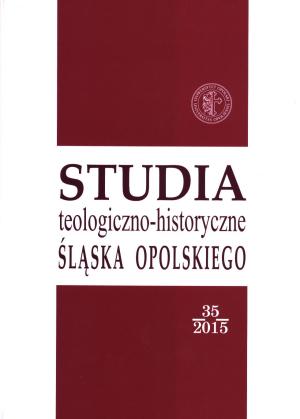Zum Selbstverständnis der theologischen Ethik im (post)säkularen Kontext
About self-understanding of the theological ethics in a (post)secularized society
Author(s): Martin M. Lintner OSMSubject(s): Christian Theology and Religion, Theology and Religion
Published by: Uniwersytet Opolski
Keywords: theological ethics; secularization; human dignity; Christian faith in the pluralistic society
Summary/Abstract: In the pluralistic (post)secularized context, the theological ethicist is just one “player” among many. As a citizen he is involved in the political process and in ethical debates and disputes. It is better to participate in those processes and debates in a secularized context than simply complain about secularization, so long as this process is not understood only negatively, i.e. as denial of religion from public space, but recognizes, that its motive forces are concerned with Christian values.One of the most important issue is the respect for the autonomy of each one, that is strictly connected with the recognition of human dignity. In a contemporary context, in which the understanding of human dignity and how human dignity can be protected are crucial ethical questions, theological ethicists have the task of introducing important ethical contents of biblical views of the person into the secularized ethical debate.The pluralistic context demands that all participants of the discourse show their world view, beliefs and assumptions and not only refer to them in their argumentation, but rather demonstrate the reasonable arguments of their statements and are open to the better arguments and new impulses. In this way the pluralistic society is well-advised to accept ethical impulses and the strength of the ethical motivation, that are included in religious beliefs, as well as the experiences and competences of beliefs of people and religious communions, fruitful for the co-existence of persons of different world view affiliations and for the common good. Those values are supported by connections between the religious and the secular ethos, and are open to the critical potential of religious beliefs.The context of each debate is the public political discourse and the rule of law. This discourse, that is obliged to keep to the rules of rational communication and to promote the non-violent force of the better argument (J. Habermas), is a forum for open competition about more human solutions of ethical conflicts, and through this towards better understanding of the person. In this context, theological ethics understands itself as a servant of the complex fullfilment of a person’s life, and the constructive co-existence of people in a pluralistic society.
Journal: Studia Teologiczno-Historyczne Śląska Opolskiego
- Issue Year: 35/2015
- Issue No: _
- Page Range: 153-176
- Page Count: 24
- Language: German

